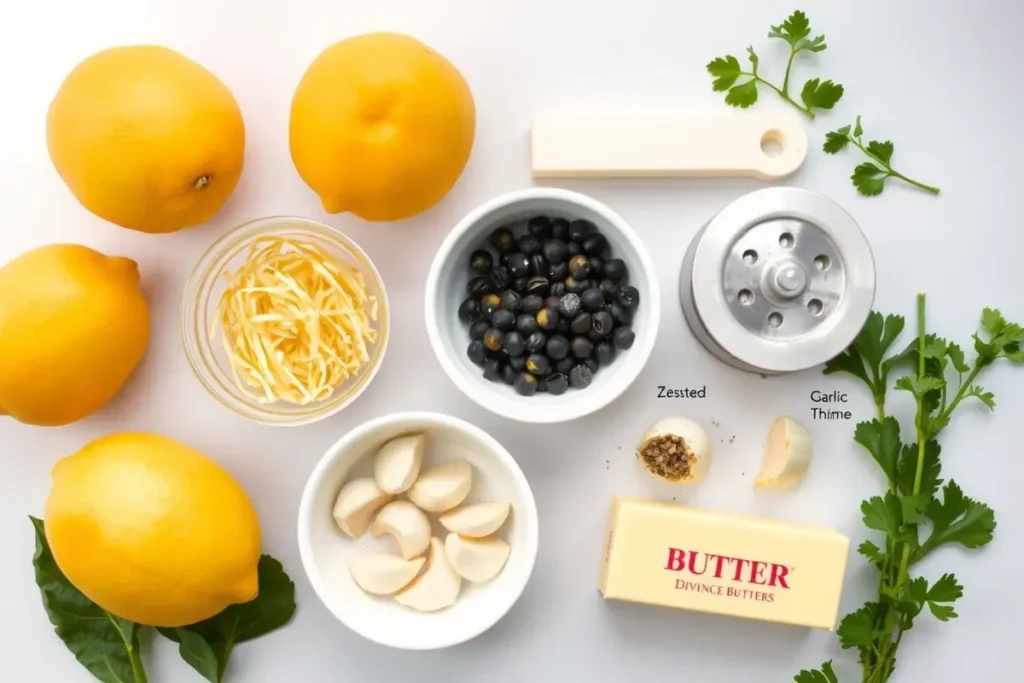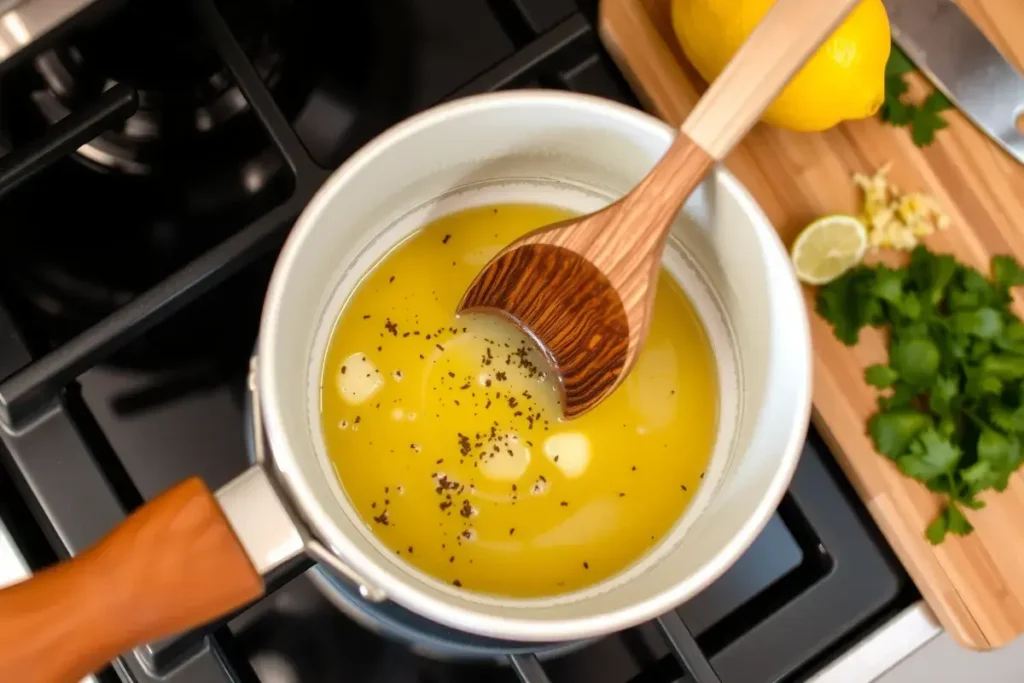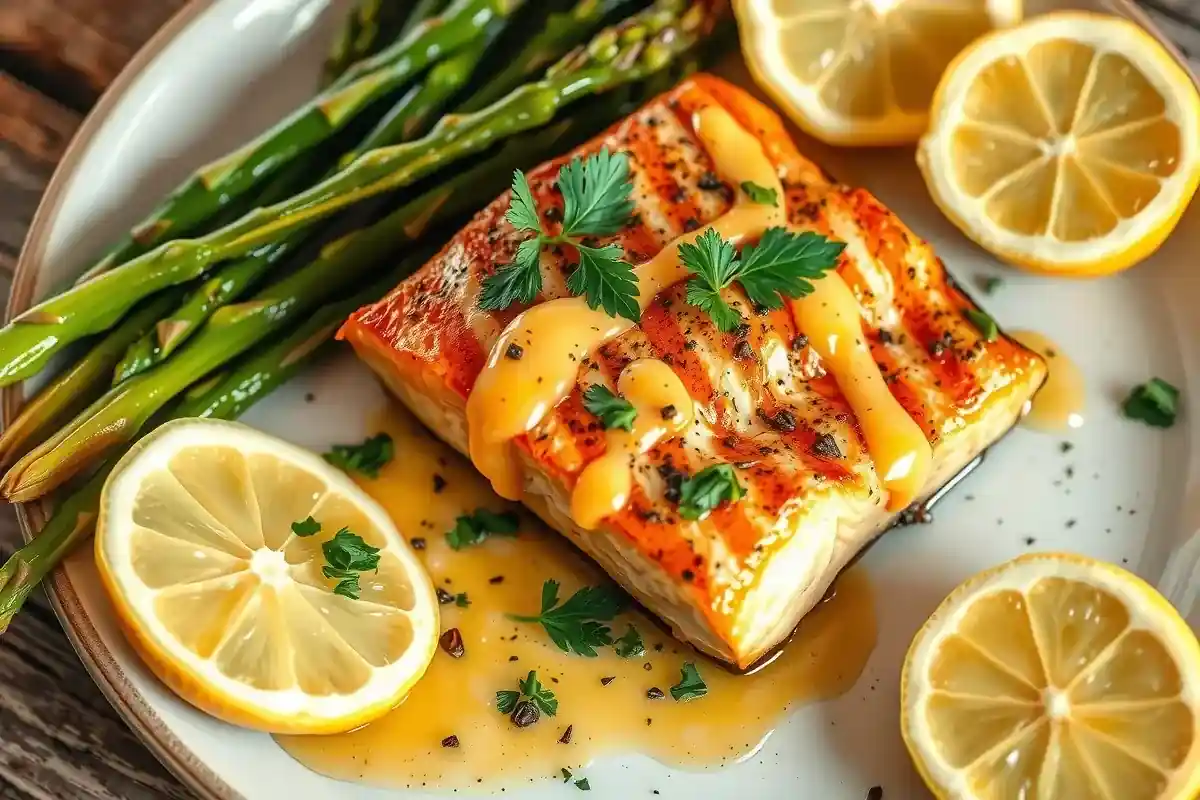Are you craving a bold, citrusy kick in your meals? Lemon pepper sauce could be the answer. This tangy blend of freshly ground pepper, vibrant lemon zest, and savory seasonings can elevate any dish. In this ultimate guide, you’ll learn all about the origins, health benefits, recipes, and creative uses of lemon pepper sauce. You’ll also discover helpful cooking techniques, storage tips, and common mistakes to avoid. Let’s dive into this comprehensive exploration of a sauce that truly deserves a prime spot in your kitchen.
Origins of Lemon Pepper Sauce
Centuries ago, cooks around the world sought new ways to bring brightness and depth to their dishes. Therefore, lemon became the go-to fruit for adding tang. Meanwhile, black pepper offered a piquant contrast. Lemon pepper sauce likely originated in cuisines that valued both citrus and spice. Mediterranean and Middle Eastern kitchens often relied on lemon for its zest. In those regions, black pepper was a treasured commodity.
However, the widespread popularity of lemon pepper seasoning truly took off in the United States during the mid-20th century. Spice makers created convenient blends of dried lemon peel, pepper, and salt, enabling home cooks to whip up zesty lemon pepper sauce in minutes. Today, you can find variations of this sauce across countless recipes, from Italian to Southern American cuisine.
Tracing Back the Key Components
- Lemon Zest: In ancient Persia and Greece, lemon rind was prized for its aromatic oils.
- Black Pepper: Hailing from India, pepper traveled along the spice routes and became a global favorite.
- Salt and Herbs: Early cooks experimented with dried herbs and sea salt to enhance flavors.
Hence, lemon pepper sauce represents a fusion of cultural traditions that value tangy citrus and pungent spices. Over time, it transformed into a staple that many people now associate with grilled fish, roasted chicken, and even popcorn toppings. Yet its adaptability has no bounds, which is why its popularity continues to rise.
Key Ingredients That Make Lemon Pepper Sauce Irresistible

When you think of lemon pepper sauce, you might picture just lemon and black pepper. However, several key components give this sauce its signature allure. While each recipe can vary, you’ll likely see these ingredients in most renditions:
- Fresh Lemon Juice and Zest: This is the heart and soul of any lemon pepper sauce. The juice contributes tanginess, whereas the zest delivers concentrated citrus oil.
- Coarsely Ground Black Pepper: For maximum flavor, freshly ground black pepper is essential. It offers a peppery punch that complements the lemon’s brightness.
- Butter or Olive Oil: Fat helps carry the flavors. Many recipes call for butter, which adds richness, while olive oil imparts a fruity aroma.
- Garlic and Onion Powder: These seasoning staples bring savory depth. In some cases, finely chopped fresh garlic or onion might substitute the powder.
- Salt: A touch of salt amplifies all the other flavors. Sea salt or kosher salt is typically preferred for its purity and clean taste.
- Optional Herbs and Spices: Some variations include oregano, thyme, or paprika. These additions customize the flavor profile and intensity.
Lemon pepper sauce is undeniably versatile. You can tweak it with honey for sweetness or red chili flakes for heat. Moreover, you can swap butter for ghee if you’re looking for a nutty undertone. Each ingredient plays a specific role, and together they form a harmonious blend that enhances your meals without overpowering them.
Health Benefits of This Zesty Marvel
Many people love this recipe for its taste. However, it also boasts certain health perks. Since you have control over the ingredients, you can make a healthier version by choosing natural, fresh, and minimally processed items. Here are the top benefits:
- Rich in Vitamin C: Lemons offer a significant dose of vitamin C, which helps immune function and collagen production. Therefore, a sauce rich in lemon juice can provide a nutrient boost to your meals.
- Digestive Aid: Black pepper contains piperine, a compound that may help digestion. This substance also has antioxidant properties.
- Reduced Sodium Option: By making your own lemon pepper sauce at home, you can control the salt content. Consequently, you’ll avoid the high sodium levels often found in store-bought seasoning blends.
- Antioxidant Properties: Both lemon zest and black pepper are rich in antioxidants. Antioxidants fight free radicals, helping to protect cells from oxidative stress.
Furthermore, preparing a homemade version allows you to limit unhealthy fats or excess sugar. You can choose heart-healthy olive oil or lower-fat butter substitutes. That way, zesty lemon pepper sauce can be a flavorful addition without sabotaging your health goals.
Creating the Perfect Lemon Pepper Sauce at Home

Crafting this recipe in your own kitchen is surprisingly easy. With a few readily available ingredients, you can conjure a zingy topping for grilled fish or a mouthwatering marinade for chicken. Follow this step-by-step process, and soon you’ll have a signature recipe:
-
Gather Your Ingredients
- 1 tablespoon lemon zest
- 2 tablespoons fresh lemon juice
- 1 teaspoon coarsely ground black pepper
- 2 tablespoons butter (or olive oil)
- 1 clove garlic, minced (or ½ teaspoon garlic powder)
- Salt to taste
-
Prep the Aromatics
Start by melting the butter over low heat or warming the olive oil in a small saucepan. Then, add the garlic. Stir gently to avoid burning. -
Incorporate Lemon Elements
Pour in the fresh lemon juice. Allow it to sizzle slightly. Next, add the lemon zest. Stir continuously to marry the citrus aromas with the fat. -
Add Pepper and Adjust Seasonings
Sprinkle in the coarsely ground black pepper. Mix thoroughly. Taste the sauce and add salt as needed. You can also include other herbs like thyme or oregano if you want extra flavor. -
Simmer Briefly
Let the sauce cook for one to two minutes. However, be cautious not to boil it, as that might reduce the lemon’s vibrancy. Remove from heat and set aside.
By following these steps, you’ll have a lemon pepper sauce that tastes fresh, tangy, and irresistibly savory. If you need a thicker consistency, whisk in a cornstarch slurry or reduce the sauce over low heat until it reaches the desired thickness.
Quick and Easy Variation for Busy Weeknights
On hectic evenings, you might need a shortcut. Therefore, you can use a store-bought lemon pepper seasoning blend and mix it with melted butter or olive oil. Add a splash of lemon juice to refresh the flavors. Although this may not pack the same punch as fresh zest and coarsely ground pepper, it’s a lifesaver when you’re in a rush.
Cooking Techniques Using Lemon Pepper Sauce
Lemon pepper sauce adapts to various cooking methods, transforming simple ingredients into gourmet delights. Whether you prefer grilling, baking, or stir-frying, this sauce offers the flexibility to shine in nearly any culinary style.
- Grilling: Brush a thin layer of lemon pepper sauce onto chicken breasts, salmon fillets, or shrimp skewers. Grill until beautifully charred. The tangy sauce caramelizes, creating an irresistible crust.
- Baking: Drizzle the sauce over your protein or vegetables before placing them in the oven. The gentle, even heat ensures flavors blend evenly.
- Sautéing or Stir-Frying: In a hot pan, coat your meats or veggies with zesty lemon pepper sauce. The quick-cooking method seals in juices while enhancing taste.
- Marinating: Soak your protein in this sauce for at least 30 minutes before cooking. The acidity tenderizes the meat, while the pepper adds a punch of spice.
These techniques allow you to explore different textures and taste profiles. For example, grilling salmon with citrus-pepper sauce creates crispy skin and a moist interior. Meanwhile, baking chicken in lemon pepper sauce yields a juicy, flavor-packed meal without much fuss.
Using Lemon Pepper Sauce for Seafood Dishes
Seafood and citrus create a natural pair. For instance, salmon, trout, and shrimp all benefit from this tangy marinade. Therefore, coat your seafood in lemon pepper sauce and let it rest for 20 minutes before grilling or broiling. This brief marination time ensures your fish absorbs the flavors without becoming overly acidic.
- Tip: For a restaurant-quality finish, place lemon slices on top of the fish before baking. The citrus slices infuse an extra burst of flavor and provide a stunning garnish.
Infusing Roasted Vegetables with Lemon Pepper Sauce
Vegetables can also benefit from lemon pepper sauce. Toss sliced zucchini, bell peppers, or broccoli florets in a light coating of the sauce before roasting. The heat accentuates the citrus undertones, while pepper adds complexity. You’ll end up with vegetables that are tender, slightly caramelized, and irresistibly delicious.
Pairing Lemon Pepper Sauce with Different Proteins
Every protein brings something unique to the table. Fortunately, this recipe can adapt to them all. Here’s how:
-
Chicken
- Best Cut: Chicken thighs or breasts.
- Cooking Method: Bake or grill to lock in juices.
- Tip: Marinate chicken overnight for a deeper flavor.
-
Fish
- Best Choice: Salmon, cod, tilapia, or shrimp.
- Cooking Method: Light brushing or short marination.
- Tip: Avoid overpowering white fish with too much pepper.
-
Beef
- Best Cut: Flank steak or sirloin.
- Cooking Method: Quick sear or grill to maintain tenderness.
- Tip: Add a pinch of chili flakes for a bolder taste.
-
Pork
- Best Cut: Pork chops or tenderloin.
- Cooking Method: Pan-sear or bake.
- Tip: Serve with a side of roasted vegetables tossed in lemon pepper sauce.
-
Tofu and Tempeh
- Best Technique: Press the tofu to remove excess moisture.
- Cooking Method: Pan-fry, grill, or bake.
- Tip: Marinate tofu or tempeh for at least 30 minutes to ensure the sauce penetrates.
No matter which protein you choose, lemon pepper sauce finds a way to complement its inherent qualities. Therefore, experiment with various meats and plant-based options. You’ll discover new favorites and gain confidence in using this sauce across all types of meals.
Lemon Pepper Sauce in Restaurant Menus
Lemon pepper sauce has become a prominent feature on many restaurant menus, especially at American casual dining spots. It’s not unusual to see lemon pepper wings at well-known chains like Buffalo Wild Wings or Wingstop. The magic lies in how this sauce can transform plain chicken wings into a tangy, peppery treat.
- Buffalo Wild Wings: Their lemon pepper sauce pairs bright citrus notes with a bold kick of black pepper. They often offer it as a dry rub or a wet sauce. Customers adore its balanced zing, which cuts through the richness of fried chicken.
- Wingstop: Known for signature flavors, Wingstop’s version frequently highlights a slightly sweeter undertone, complementing the tang.
- Local Restaurants and Chefs: You may also find artisanal takes on this sauce, sometimes featuring unique twists like smoked peppercorns or organic citrus.
Therefore, lemon pepper sauce is not just a homemade favorite—it has a strong foothold in the commercial food scene. It’s beloved for its ability to appeal to multiple palates, from spice enthusiasts to those who crave something refreshing and bright.
Storage and Shelf Life
Storing your freshly made lemon pepper sauce properly ensures you get the most out of its vibrant flavors. Here’s how:
- Refrigeration: Transfer the sauce to an airtight container or jar. Keep it refrigerated at 40°F (4°C) or below. Properly stored, your sauce should remain fresh for up to one week.
- Freezing: If you want to extend its shelf life, freeze individual portions in ice cube trays. Once frozen, transfer the cubes to a zip-top bag. They’ll last about two months in the freezer.
- Reheating: Gently warm the sauce in a pan or microwave. However, avoid boiling it. High heat can diminish the citrus essence and potentially separate the fats.
To maintain the best taste, make small batches. Freshly made lemon pepper sauce usually delivers the brightest flavor. That said, if you do store leftovers, be mindful of signs of spoilage like off smells or discoloration. Discard the sauce if it doesn’t smell right.
Common Mistakes to Avoid
Even though lemon pepper sauce is quite straightforward, certain pitfalls can ruin its flavor and texture. Here are some common mistakes to sidestep:
-
Using Bottled Lemon Juice Instead of Fresh
Bottled juice often lacks the zing and subtle oils found in fresh lemons. Therefore, always opt for fresh citrus if possible. -
Skipping the Zest
Lemon zest holds concentrated flavor. Without it, your sauce will lack the full-bodied citrus profile that makes lemon pepper sauce so appealing. -
Overcooking the Sauce
High heat can make the sauce bitter or cause the butter to separate. Consequently, simmer the sauce gently, and remove it from the stove as soon as it thickens or warms through. -
Using Pre-Ground Pepper
Pre-ground pepper quickly loses potency. If you want a robust peppery kick, grind your peppercorns just before cooking. -
Forgetting to Taste and Adjust
Seasoning is subjective. It’s crucial to taste the sauce and adjust salt, pepper, or lemon juice to suit your preferences.
By avoiding these mistakes, you’ll ensure your lemon pepper sauce consistently hits the right notes. With time, you’ll develop a chef-like intuition for balancing citrus, spice, and salt.
FAQ (People Also Ask)
What is in buffalo wild wings lemon pepper sauce?
Buffalo Wild Wings lemon pepper sauce typically includes lemon zest, black pepper, salt, and an oil or butter base. Some variations contain garlic and additional spices for extra depth. Their version often balances tangy citrus with a noticeable peppery bite. Therefore, it appeals to those who love a zesty, slightly spicy wing flavor.
How long does lemon pepper sauce last?
When stored in an airtight container in the refrigerator, lemon pepper sauce can last up to one week. However, it’s best to consume it within a few days for optimal freshness. If you want to extend its shelf life, freeze portions in ice cube trays for up to two months.
What is another name for a lemon pepper?
Sometimes, people refer to lemon pepper seasoning as citrus pepper or citrus-pepper blend. However, these terms usually apply to dry seasonings rather than the sauce. The common thread is the combination of tangy lemon and black pepper to achieve a signature taste.
What is a spicy pepper sauce called?
A spicy pepper sauce can have numerous names, depending on the ingredients and origin. For example, hot sauces like Tabasco, Sriracha, or Harissa feature different peppers and seasonings. The heat level and flavor vary, making each sauce distinct. In the context of lemon pepper sauce, you could add chili flakes or cayenne to achieve a spicy kick.
Conclusion
this recipe shines as a versatile, tangy companion for countless dishes. Its balance of citrus and pepper offers a refreshing contrast to rich ingredients like butter or oil. Because you can tailor the sauce to your taste preferences—adding herbs, modifying the level of tang, or cranking up the heat—it suits various cuisines. Whether you’re drizzling it over vegetables, marinating meats, or enhancing your favorite wings, lemon pepper sauce consistently elevates meals. Give it a try in your next recipe, and you’ll discover why this bright, peppery blend is a true culinary treasure.


